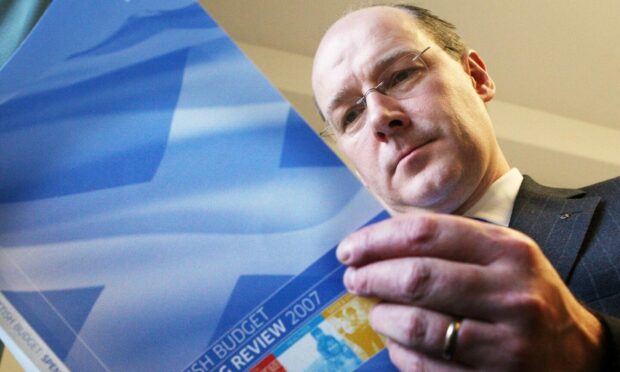John Swinney threatened to strip school education from councils in his first budget as finance chief in an SNP government.
The explosive revelation is contained in confidential Cabinet papers from 2007 that can be made public for the first time.
It comes as Mr Swinney continues to negotiate with councils on difficult budget settlements today.
Within months of the SNP first coming to power at Holyrood, Mr Swinney told his colleagues they could “centralise the delivery of school education”.
The threat to councils was to be made if a deal between local authorities and Alex Salmond’s minority government needed to be “forced through”.
Such a move would have decimated the nation’s 32 local authorities, which spend close to half of their revenue budgets on education.
One serious option would be to indicate that we plan to centralise the delivery of school education.
– John Swinney, 2007.
James Mitchell, professor of public policy at Edinburgh University, said the threat may just have been a sign of “inexperience and frustration”.
But he also described it as a “throw-back to the days of the Scottish Office under the Tories”.
Mr Swinney, who was North Tayside MSP at the time and now represents Perthshire North, went on to agree a “historic concordat” with council umbrella body Cosla in November 2007.
Under the agreement, councils agreed to delivery SNP manifesto pledges, such as freezing council tax, reducing class sizes and increasing pre-school provision.
In return local authorities were given more flexibility through the removal of “ring-fenced” funding, and the power to keep all efficiency savings.
A few weeks before the concordat was signed, newly-released files show Mr Swinney warned his colleagues they may need to bully council chiefs into accepting the government’s terms.
‘Play hardball’
Ahead of a Cabinet meeting on October 16, 2007, the then finance minister wrote: “As a last resort… we may need to be prepared to play hardball with Cosla if a deal needs to be forced through.
“In that case… we may need to deploy some real threats.
“There would be a risk to doing so. It would clearly sour any new relationship.
“We would also have to be in a position to deliver on any threats.
“One such more serious option would be to indicate that we plan to centralise th delivery of school education and leave councils to deal with peripheral matters such as placing requests.”
In the paper, Mr Swinney also discussed how the settlement the Holyrood government had received from Westminster had been the “worst since devolution”.
It added: “It will make it much harder to secure a deal with local government to deliver many of our manifesto commitments.”
Details of Mr Swinney’s tactics have emerged amid a fresh row about SNP funding of councils, 15 years later.
The deputy first minister said in his budget speech last month that local authorities would receive an extra £570m, but Cosla said the the uplift was really worth £71m.
Expert analysis
Mr Mitchell highlighted the cross-party McIntosh report that was published just after the Scottish Parliament was established.
It promised a new era in relations between between central and local government, recommending a “parity of esteem” and “mutual respect”.
On Mr Swinney’s threat to strip councils of education powers, Prof Mitchell said: “While the 2007 concordat between Cosla and the Scottish Government was a step in the right direction, what we now see is that pre-devolution attitudes still existed.
“Tough negotiations are often necessary but threats of this kind are a throw-back to the days of the Scottish Office under the Tories.
“This threat may simply have been a sign of inexperience and frustration but it showed little understanding of the vital need for partnership in the provision of public services.
“The idea that centralisation can help close the educational attainment gap should by now be seen as counter-productive.
“Sadly, the SNP government pursues an approach to local democracy reminiscent of pre-devolution times.”



Conversation